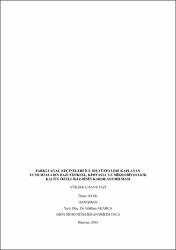| dc.contributor.advisor | Akarca, Gökhan | |
| dc.contributor.author | İstek, Ömer | |
| dc.date.accessioned | 2019-05-27T10:42:43Z | |
| dc.date.available | 2019-05-27T10:42:43Z | |
| dc.date.issued | 2016 | |
| dc.identifier.uri | http://hdl.handle.net/11630/6188 | |
| dc.description.abstract | Bu araştırmada; yumurtaların raf ömrünün arttırılması ve mikrobiyolojik kontaminasyonların azaltılması hedeflenerek, gıda sanayiinde hijyenik yönden daha güvenilir ve daha uzun süre tazeliğini koruyan ürünlerin sunulması amaçlanmıştır. Bu amaçla; yumurtalar önce 15 oC deki çeşme suyu ile yıkanmış, ardından üç farklı ağacın (badem, kayısı ve vişne) gövdelerinden el ile toplanan reçinelerle kaplanmıştır. Numuneler iki farklı depolama koşulunda 6 aylık zaman periyodunda depolanmış ve bu süre içerisinde depolamaya bağlı olan değişimleri incelenmiştir.
Depolama süresinin 0., 7., 14., 28., 40., 60., 90., 120., 150. ve 180. günlerinde numunelerde fiziksel olarak; ağırlık kaybı, hava boşluğu, haugh birimi, ak (albümin) ve sarı (yolk) indeksi, şekil indeksi ve kabuk kalınlığı, kimyasal olarak ise ak (albümin) ve sarı (yolk) pH analizleri yapılmıştır. Mikrobiyolojik olarak; Salmonella cinsi bakteri, toplam aerobik mezofil bakteri, toplam aerobik psikrofil bakteri, maya-küf, toplam koliform grubu bakteri, toplam Enterebacteriaceae, Staphylococcus aureus, Pseudomonas spp. cinsi bakteri sayıları incelenmiştir.
Depolama süresince fiziksel olarak yapılan analizlerde; kaplama yapılmayan numunelere göre kaplanmış numuneler de kayıpların veya azalmaların daha az olduğu belirlenmiştir.
Kimyasal olarak yapılan analizlerde; farklı ağaç reçinesi ile kaplanmış numunelerdeki pH artışının diğer numunelere göre daha az artış gösterdiği tespit edilmiştir.
Mikrobiyolojik olarak yapılan analizlerde ise; depolama süresinin sonunda kadar yapılan analizler de mikrobiyal üremenin en fazla yıkama işlemi yapılan yumurta numunesinde olduğu ve farklı koşullardaki depolamanın 22 oC’de 40. günde ve 4 oC’de 60. günde mikrobiyolojik olarak bozulmuştur. Buna benzer olarak kontrol numunesi ise; değişik şartlardaki depolamanın 22 oC’de 60. günde ve 4 oC’de 90. günde mikrobiyolojik açıdan bozulduğu tespit edilmiştir. Farklı ağaç reçinesi ile kaplama yapılan numunelerden ise, sadece 22 oC’de depolama yapılan kayısı reçinesi ile kaplanmış yumurta numunelerin 120. günde mikrobiyolojik olarak bozulduğu belirlenmiştir. Diğer kaplanmış numunelerde ise, herhangi bir bozulma tespit edilmemiştir.
Farklı ağaç reçineleriyle (badem, kayısı, vişne) kaplanan yumurtaların raf ömrünün 180 güne kadar uzatıldığı, yumurtaların kabuğundaki porların kaplama sonucu ortamdan geçebilecek mikroorganizma yoğunluğunu azalttığı, yumurta kabuğundaki kırılmalara karşı mukavemeti arttırdığı ve yumurtaların daha uzun süre taze kalması sağlandığı belirlenmiştir. | en_US |
| dc.description.abstract | The aim of this research was to provide safe and long shelf life egg product and reduce the microbiological contamination by coating eggs with resins of the diffrent trees. First of all, the eggs were washed with tap water at 15 oC. Then eggs surfaces were coated with resins which were collected from the surface of different tree (almond, apricot and cherrier). Finally the eggs were stored for 6 mounths and changes in the quality characteristics were observed.
During storage 0., 7., 14., 28., 40., 60., 90., 120., 150. and 180. day the samples were analyzed physically, for their weight loss, air gap, haugh unit, albumin and yolk index, shape index, shell thickness the pH of albumin yolk, microbiologicaly in terms of Salmonella, total aerobic mesophilic bacteria, total aerobic psychrophylic bacteria, yeast and mold, total coliform bacteria, total Enterobacteriaceae, Staphylococcus aureus, Pseudomonas spp.
According to the physical analysis which were made during the storage, losses and reductions were lesser in the coated samples than the uncouted samples.
After chemical analysis; it is determined that the pH increases in the coated samples with different tree resins were lesser than the other samples.
After microbiological analysis; highest microbiological growth was determined in the washed eggs samples. It was determined that unwashed and stored at 22 °C and 4°C samples were deteriorated at 40 and 60 day of the storage respectively. Similarly, control samples stored at 22 °C and 4°C were deteriorated at 60 and 90 day of the storage respectively. Among the coated eggs, coated eggs with apricot resins stored at 22 °C were deteriorated at 120 day of the storage. But any microbiological growth observed in the other coated samples.
As a result of this study, it is determined that, the shelf life of the coated eggs with different tree resins (almond, apricot, cherry) was extended until 180 days. Also it was determined that coating with resins decreases the number of microorganisims which penetrate through shell pores and the internal environment of the eggs, increases the resistance of the eggs and provides the eggs to stay fresh longer. | |
| dc.language.iso | tur | en_US |
| dc.rights | info:eu-repo/semantics/openAccess | en_US |
| dc.subject | Ağaç Reçinesi | en_US |
| dc.subject | Yenilebilir Film Kaplama | |
| dc.subject | Yumurta | |
| dc.subject | Depolama | |
| dc.title | Farklı ağaç reçineleri ile dış yüzeyleri kaplanan yumurtaların bazı fiziksel, kimyasal ve mikrobiyolojik kalite özelliklerinin karşılaştırılması | en_US |
| dc.title.alternative | Comparıson of the some physical, chemical and microbiological quality properties of the coated eggs with resins of the different trees | en_US |
| dc.type | masterThesis | en_US |
| dc.department | Afyon Kocatepe Üniversitesi, Fen Bilimleri Enstitüsü | en_US |
| dc.identifier.startpage | 1 | en_US |
| dc.identifier.endpage | 161 | en_US |
| dc.relation.publicationcategory | Tez | en_US |



















